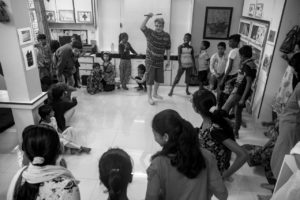Learning to ‘Un’
Dec. 14
“The Artist is no other than he who unlearns what he has learned, in order to know himself,” E.E. Cummings
Quotations have the wonderful propensity of popping up in one’s life when one is best ready to receive them. Recently, E.E. Cummings quote appeared (and I now forget where, unfortunately) and I found myself swept up into it. At first, because I recognize that I occasionally shudder when faced with people who fashion themselves as ‘experts,’ full of jargon and established tropes that demonstrate a vast knowledge of ‘how things are.’ However, as I participated in two different events recently, I got to thinking about the quote from another perspective.
A few days ago I had the opportunity to engage with an organization that caters specifically to children of the slum areas around here. I conducted a workshop for about 30 young people as a demonstration of my work in the hopes that I and another colleague might get the future chance to develop a more extensive arts-based program for such children. We all figured there would be some language issues and a couple of folks harbored the concern that as it was the kids’ first experience with me, they might be a bit shy. I created a vague plan in my mind, but then stayed flexible as I started to engage with the many kids in a small room, surrounded by a bevy of adults observing. The kids joined in eagerly. They began to jump in to translate for each other. With time, a little chaos settled in as well, with many of them feeling free to hustle off to the washroom whenever they pleased and some stepping back to take ‘breaks’ even as we kept working. Shyness popped up on occasion, but was as quickly overcome. I was emboldened enough to start challenging the break-takers and  wanderers and even the occasional fool-arounders. I think, in many ways, those were the moments the adults liked the best. And, I believe, helped me form a tighter relationship with the kids. I took their challenges as my challenge and used those challenges to bring us together in engaging ways. During a formal break about half of the kids hung around wanting to know my name (even though I had introduced it previously), where I lived, my family, etc. But I think they also wanted to show off a bit of their English skills.
wanderers and even the occasional fool-arounders. I think, in many ways, those were the moments the adults liked the best. And, I believe, helped me form a tighter relationship with the kids. I took their challenges as my challenge and used those challenges to bring us together in engaging ways. During a formal break about half of the kids hung around wanting to know my name (even though I had introduced it previously), where I lived, my family, etc. But I think they also wanted to show off a bit of their English skills.
A day later, I presented a small talk about my work, etc. with an intimate group of local theatre artists. I was invited to speak by a group I do not know, in a place I had never been, to a purpose I was unsure about and to some minor competing reasons offered by a handful of folk I was able to talk with before the talk. Fortunately, as I sat in my center stage chair with the audience tightly surrounding me on the stage, they agreed we should remain informal and allow plenty of time for them to ask questions about myself and work. The one thing I knew entering the situation was that theatre for, with and about children is not generally highly regarded. So I felt I needed to touch on that subject in a way that would not alienate the audience, yet still promote the need and necessity. The audience was quietly accepting and several had many good questions that allowed me to advocate for the importance of theatre in society in multiple ways, as a necessity to validate our experiences as humans, in common. I was pretty pleased when the audience reacted very positively to the point of children deserving the best we have to offer as artists to contribute to the good of our shared communities.
Looking at Cummings’ quote after these events, it seemed to me that the ‘unlearning’ isn’t about letting go of who we are or what we believe, but not letting our imagined ‘expertise’ become an obstacle to being enriched by those we have the occasion to share with. That expertise is simply a doorway into coming to better know and appreciate the world and our fellow humans, not particularly to have them better respect us. Learning to utilize the expertise as a means of connecting with others, enriches us as an individual.
